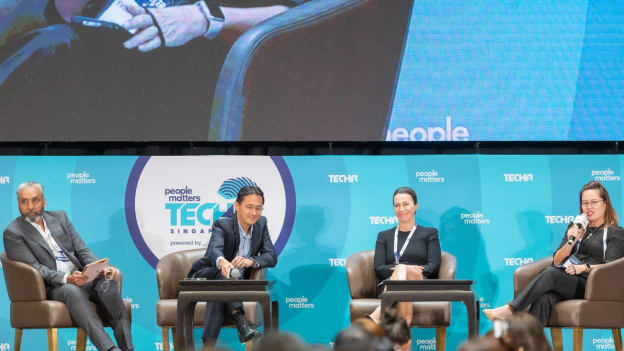Addressing the evolving role of HR amid the rise of global work

The looming global recession, ongoing labour shortages, cost reductions, increasing layoffs, and supply chain disruptions all influence the hiring landscape and talent availability. How can organisations proactively address these challenges to build a competitive talent pool?
In a power panel session at People Matters TechHR Singapore 2023 last month, we heard from industry leaders: Yvonne Tan, Chief People Officer of Dentsu International; Narelle Burke, CHRO of People Function at Insights APAC & Global Consulting at Kantar; and Khang Nguyen Trieu, Group Chief Technology Architect of Accor.
Moderating the session, Mark Samlal, General Manager of Deel APAC kicked off with the observation that substantial macroeconomic challenges are affecting economies and industries right here in Asia, and this trend appears to be intensifying.
"Labour force dynamics continue to evolve in the US, which, hopefully, will create opportunities for us in Asia. We are particularly noticing labour shortages, especially in high-demand fields like technology,” he said.
Nguyen Trieu shared his experience with one of those affected industries: “Before the onset of COVID-19, Accor operated as a standard international company with its headquarters in France, where the majority of our technology teams were based. In regions such as Southeast Asia, the Asia-Pacific, and the US, local IT teams primarily handled local support. However, the COVID-19 pandemic brought about significant changes. In the technology sector, we faced challenges over the past two years, struggling to expand our workforce in France due to the shortage of technology resources, a situation mirrored in many countries. During the Accor Tech Expo, we initiated discussions on how to potentially operate on a different scale and establish a closer presence in our global business operations. After considering various locations, we conducted a study that indicated the feasibility of expanding our tech center in Bangkok. Consequently, we are in the process of expanding our team there, marking a significant shift for our teams in France, who have been accustomed to working in the same time zone,”
Combating diversity challenges in recruitment
Sharing insights on dealing with diversity challenges out of global operations, Nguyen Trieu said, “What we've come to realise is that even within international companies, teams often consist of individuals from the same country or culture due to localised operations. However, as we move towards a more global approach, assembling teams with members from different regions, can lead to cultural clashes if not managed properly. As part of the ongoing transformation efforts, we are emphasizing the importance of multicultural education, particularly from a leadership perspective. This isn't limited to our employees but extends to our leaders who may have had less exposure to such diverse working environments.”
Cultural challenges and digital transformation
AI and changing business models have introduced tension in work culture. Commenting on this, Kantar's Burke said, “When we consider the impact of COVID-19 and the acceleration of our digital transformation, it streamlined our processes and improved efficiency without altering the nature of the work. However, the progress in AI suggests that we are about six months away from a transformative shift that will fundamentally change roles and reduce workload. In today's large multinational organisations, there is a significant emphasis on productivity, efficiency, and labour costs. With this accelerating technological change, we need to prepare and adapt to these changes much more rapidly.”
Predicting the acceleration of AI transforming workplaces over the next 10 years, Burke added, “By the end of this year, we'll assess what we can streamline and remove to simplify processes. By the end of next year, I anticipate significant role changes. We'll be reevaluating the roles of graduates and our bench strength, their locations, and the nature of their work. In our fields—data, science, analytics, and consulting—some roles will vanish entirely, which we're already aware of. Looking ahead to 2025, we expect substantial shifts in workforce composition. For organisations like ours, where 70% of costs are personnel-related, this represents a substantial base for transformation compared to consumer-focused businesses.”
Adding to this, Yvonne Tan said, “In our industries, marketing and advertising are rapidly advancing with AI technologies. Being a Japanese-origin and Asian-origin company, Dentsu places a strong emphasis on careful and deliberate governance steps before fully embracing AI. While our creatives in various countries are eager for the latest innovations, our legal and compliance teams are ensuring a responsible approach.”
Return to work/office - The ground reality
Today, one of the most pressing challenges faced by HR and in fact all leaders is the return to the workplace, which raises questions about various work arrangements and employees advocating for remote work.
Referring to Daniel Pink's book 'Drive,’ emphasising autonomy and the power of choice, Tan said, “One-size-fits-all doesn't work. We've all likely been in interviews where candidates are hesitant because the company mandates office work that doesn't align with their lifestyle. At Dentsu, we've adopted a policy called, 'Be The Best You.' It focuses on purpose, not percentages—meaning, what's the purpose of your work? If it's solo work, you can do it from home. For group work, the office might be best. It's about designing your day based on the work's purpose, giving employees the power to decide.”
Burke added, “You must consider what your employees want and your clients' needs in the markets you operate in. It's essential to tailor your approach based on your organisation's culture and context. We have a hybrid working policy to accommodate client-facing roles, but technology quality remains a challenge. Additionally, different generations have varied experiences. During COVID, we onboarded many graduates who were comfortable with virtual work but lacked in-office experience. The key is to assess your unique context, prioritise what matters, and adapt accordingly. A one-size-fits-all approach doesn't apply to markets or companies.”
Furthermore, Nguyen Trieu added, “It's important to note that even before COVID, some companies operated fully remotely. Today, if we were to ask how many people want to work five days in the office, the reality is that only about 28% prefer full-time office work. Commuting and productivity factors contribute to this preference. The current trend of companies calling employees back to the office is a part of change management—a pendulum shift. While COVID led everyone back to the office for a couple of years, it's a relatively short period compared to the decades of primarily office-based work. In the next decade, we may see a reversal, with approximately 80% of companies operating either at a high level of remote work or fully remote. Transitioning from hybrid to fully remote can be challenging for leaders and employees alike. Developing remote work skills will become increasingly important in the coming years”
Technologies supporting emerging workplace trends
It is not the role of technology, but of humans, when it comes to making remote work culture a success, says Nguyen Trieu, adding, “At Accor, we recognise that what fosters a sense of unity among employees is people coming together and spending time with each other, creating a shared sense of values by spending time together, similar to the effect of being in an office setup. In establishing the Tech Center, we are also exploring how to facilitate in-person meetings because working remotely doesn't mean people should no longer meet”.
Sharing key aspects on this, Narelle Burke said, “First, we should have the ability to access the tools required for our work from any location worldwide. Setting up meeting rooms and dealing with technology issues can be frustrating. Often, the tools we have at home are better than what's available in the workplace, which presents a challenge. Therefore, there needs to be a significant investment and shift in ensuring remote effectiveness.
- Second, our approach to working with technology needs to change. We still rely heavily on emails when alternatives like emojis and collaborative platforms are available. There's a massive shift in how we collaborate and work effectively.
- Lastly, we should pay attention to the types of meetings and communication taking place. During COVID, people's networks and informal interactions decreased. We need to facilitate informal conversations, networks, mentoring, and on-the-job training, and technology can play a crucial role in all of these aspects.”
Tan added, “As HR professionals, we are all in a constant learning process. I sometimes feel fatigued; the stimulation can be overwhelming, and the travel and commute can be too demanding. So, I'm adapting. We are all human, and despite being part of Zoom-based organisations, I always emphasize the importance of experiencing the policies we create and the initiatives we ask our leaders to drive.”
Multi-dimensional role of HR
Explaining how the role of HR is evolving, Burke shared, “The role of HR has transformed significantly. At Kantar, where 70% of our costs are personnel-related, every decision holds implications for our people. As a result, HR takes a central position. We've observed that the CEO, CFO, and CHRO frequently meet to discuss critical matters, whether it's adjustments to billable hours or utilisation ratios. We actively participate in management and strategy reviews, serving as essential partners. The key shift is taking ownership; decisions can't be solely finance-driven due to their profound implications—a significant change in recent years.”
Tan added, “COVID thrust HR into the spotlight, but the key question now is whether HR will maintain its position. To do so effectively, HR must grasp financials and business operations to contribute meaningfully. HR's role is evolving, emphasizing an outward focus - solving business problems. Understanding the business and collaborating closely with our allies in finance is essential; they are our partners in this journey.”
Emerging workplace trends and the role of HR
Each of the panellists offered their own predictions about what HR may have to deal with in the near future, with a few common themes quickly emerging across their diverse industries.
Forecasting upcoming labour trends, Nguyen Trieu said, “I see three things happening.
- Remote work remains significant due to ongoing network-driven changes, shaping the future of work.
- The rapid advancement of generative AI demands a quick upskilling of the workforce to adapt to new job opportunities created by this technology.
- A rising trend, especially among younger generations, is the desire to combine work and leisure in different locations. This 'work vision' poses challenges, including tax considerations, for the hospitality industry.
Burke's predictions also touched on technology and employee expectations:
- First, multinationals and companies worldwide are pushing for increased productivity and efficiency, putting significant pressure on employee well-being and expectations. Teams are running at high capacity, causing burnout and stress.
- Second, technology, particularly AI, is poised to alleviate this pressure by automating low-value tasks. This shift, termed "expertise amplified by tech," demands a focus on developing the necessary skills to work effectively with technology.
- Lastly, the location of the workforce and compliance with existing regulatory frameworks pose challenges. Managing a dispersed workforce and navigating labour regulations are critical issues to address.”
And Tan also highlighted the challenge with a dispersed workforce, saying: “Many of us have family members scattered around the world, making it essential to accommodate personal preferences for work locations."
- This necessitates HR professionals to navigate international tax and legal considerations when employees wish to work abroad.
- HR's role in Learning and Development is evolving. Instead of HR delivering L&D, the focus is shifting towards leveraging community expertise through crowdsourcing and open-sourcing, enabling employees to learn from their peers.
- Given the urgency of climate change, people are increasingly seeking employment with companies whose values align with their own. The labour movement is expected to favour organisations driven by a clear sense of purpose.













